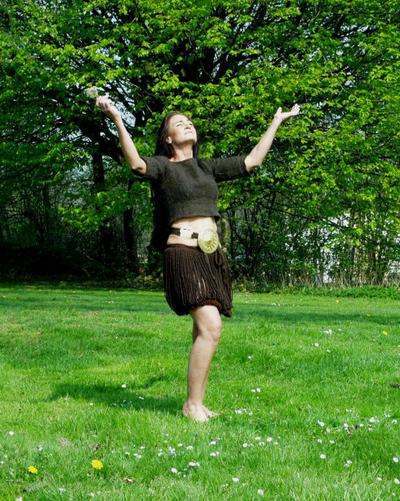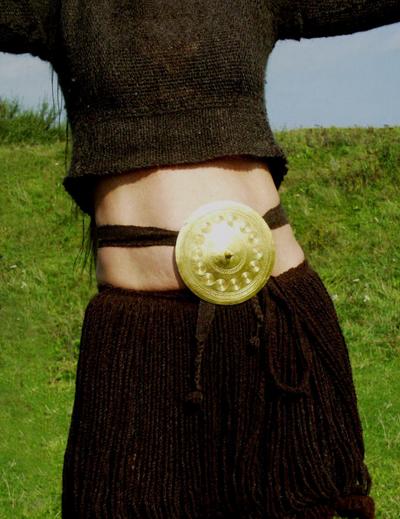Bronze Age dance
In 1999 dancer Anni Brøgger visited The National Museum. As a professional dancer, she was fascinated by the Egtved Girl’s costume, and she believed that the suit, the cord skirt and belt plate, was extremely well suited for dancing. The Bronze Age has performed a variety of ritual dances. In many rock carvings, especially from Bohuslän in western Sweden, we see images that can only be understood as representations of ritual dance where movement was important.
A dance like the Girl from Egtved
Anni Brøgger preformed a dance in a copy of the Egtved Girl’s costume. It was an exciting experience to see the dress and belt plate in use. It was even more exciting to get outdoors and see the dance performed in the sunlight. - Finally, a copy of an older Bronze Age belt plate was subjected to a kind of experimental archaeological study in which the audience could see and feel how it works or appear at various dance movements.
For many years Anni Brøgger has worked with belly dancing. As soon as she started belly dancing, something happens with belt plate. When she made a circular motion with her stomach, the sun's glare appeared around in spirals. From the perspective of the viewer it looks like the sun is running around the spirals from left to right in the coils, which is quite vivid. Through dance and body movement and inspiration from the divine sun itself, the story of the sun's eternal process becomes alive.


Dance the sun down on earth
Through another belly dance movement in which the dancer so to speak tilt her stomach on the horizontal plane, the sun’s glare jumps around on the belt plate. The belt plate has a flat edge piece that is polished. When the sun's light hits the polished edge of the belt plate, it forms a true reflection of the sun, because the viewer is momentarily completely blinded.
At such an experimental archaeological research, it can be proved that in the Bronze Age - alongside many other forms of ritual dances - also has danced a kind of belly dancing. Anni Brøggers dance has shown - without even her realising it - the belt plate was so to speak, 'born to dance'. In the Bronze Age you could both physically and metaphorically pull the sun down to earth through the belt plate and the dancing body.
